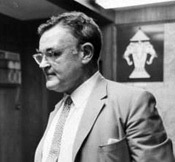US/Ambassador/Democratic Republic of the Congo
(Ambassador to the DRC) | |
|---|---|
 During G. McMurtrie Godley's time as ambassador, Mobutu Sese Seko staged a second coup and seized control of the country. | |
| The United States Ambassador to the Democratic Republic of the Congo. |
The United States Ambassador to the Democratic Republic of the Congo (1971-1997 Zaïre) is the highest diplomatic representative of the United States to the Democratic Republic of the Congo. The large country's vast mineral wealth and strategic location makes it important for the United States, despite the traditional corruption and inefficiency of its governments.
History
After the assassinations of independence leader Patrice Lumumba and UN Secretary-General Dag Hammarskjöld, and the following installation of puppet leader Joseph Mobutu, the country had a strong alliance with the United State until the end of the Cold War.
This was in part because Zairian leader Mobutu was considered to be a strong anti-communist, and the United States government saw Zaire as a useful buffer to prevent the spread of Marxism in Africa. Mobutu himself was friendly with most of the U.S. Presidents during his presidency, and was also able to get a lot of foreign aid from the U.S. and the west.
Zaire was also a base for the CIA operation in the Angolan Civil War after the withdrawal of colonial power Portugal.[1]
The corruption and inefficiency of the Mobutu government hindered use of the country's vast mineral resources, and the US might have considered a coup against him when Deane R. Hinton was ambassador.
Some theories pose that CIA might have been involved in the assassination of President Laurent-Désiré Kabila in 2001[2]
Office Holders on Wikispooks
| Name | From | To | Description |
|---|---|---|---|
| Robert Oakley | 6 November 1979 | 22 August 1982 | |
| Walter Cutler | 1975 | 1979 | |
| Robert McBride | 1967 | 1969 | |
| G. McMurtrie Godley | 23 March 1964 | 15 October 1966 | During his time as ambassador, Mobutu Sese Seko staged a second coup and seized control of the country. |
| Ed Gullion | 11 September 1961 | 20 February 1964 | A week after he arrived in Zaire, Dag Hammarskjöld's plane crashed. |